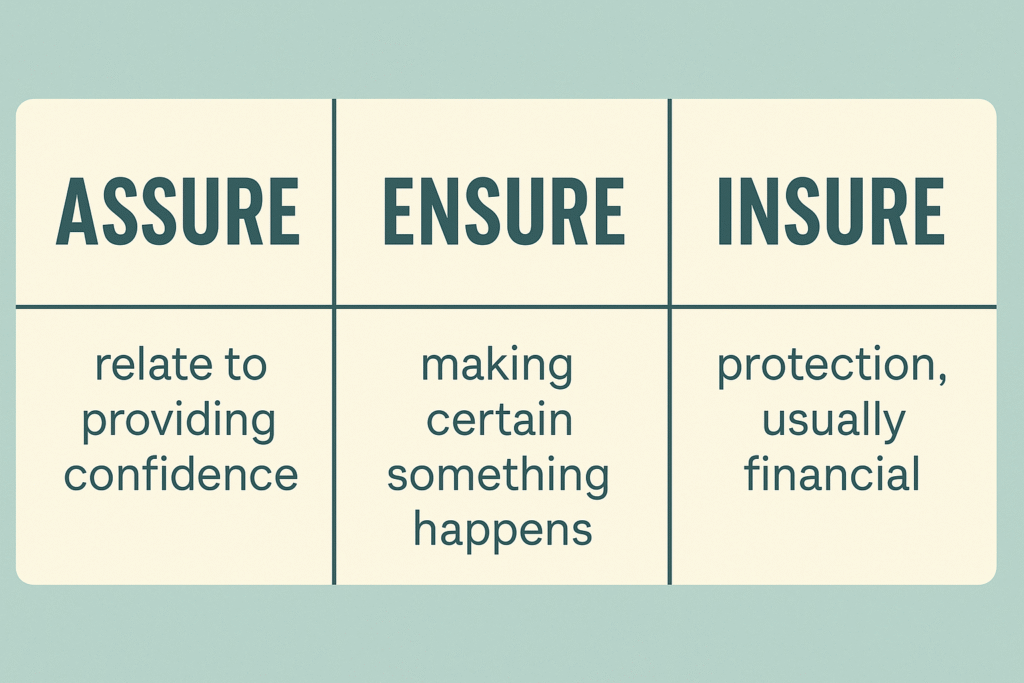Assure vs. Ensure vs. Insure

When it comes to writing with clarity, few word choices cause as much confusion as assure vs ensure vs insure. These three verbs often get mixed up because they sound similar and all deal with the idea of certainty or protection but they are not interchangeable.
Here’s the simple breakdown:
- Use assure when you are giving confidence to a person.
- Use ensure when you are making sure an event or result happens.
- Use insure when you are talking about financial protection against risk.
Choosing the right word between assure, ensure, and insure helps you communicate more precisely and avoid the common mistakes that can make your writing unclear. This guide will show you how these words work, when to use each one, and how to easily remember the difference.
Related post: Affect vs. Effect
Explore more: See our verb/noun confusion series
Grammatical Explanation: Assure vs Ensure vs Insure
The words assure, ensure, and insure are all verbs, but they differ in meaning, object, and context.
| Word | Meaning | Used With | Example |
|---|---|---|---|
| Assure | To remove doubt or give confidence | A person (direct object) | I assure you that the report will be ready. |
| Ensure | To make certain that something happens | An action, event, or result | Please ensure that the door is locked. |
| Insure | To provide financial protection | Property, health, life | We need to insure the car against theft. |
Key Differences:
- Assure always involves reassuring someone directly.
- Ensure is about taking action to guarantee an outcome.
- Insure refers specifically to insurance or coverage against risks.
Examples of Assure vs Ensure vs Insure
Correct Usage Of:
Assure
- I assure you that the meeting will start on time.
- She assured him that everything was under control.
Ensure
- Please ensure that all files are saved before shutting down the system.
- We must ensure the safety of the participants.
Insure
- It’s important to insure your home against natural disasters.
- The company insures all its delivery vehicles.
Common Mistakes to Avoid
Writers often confuse these words because they all touch on the idea of certainty—but the context makes all the difference.
Example 1:
Incorrect: I assure that the process will be completed.
Correct: I ensure that the process will be completed.
Example 2:
Incorrect: I will insure you that the project is on track.
Correct: I will assure you that the project is on track.
Quick Reminder:
- Assure = Reassure a person.
- Ensure = Guarantee an outcome.
- Insure = Provide financial protection.
To avoid these errors, stay consistent with your audience’s style guide (e.g., APA, Oxford, Chicago) and double-check for context.
Memory Tips for Assure vs Ensure vs Insure
Here are easy ways to remember which word to use:
- Assure → Think “A” for Affirmation to a person.
- Ensure → Think “E” for Everything happens (making sure it happens).
- Insure → Think “I” for Insurance (financial coverage).
Helpful phrase to keep in mind:
“Assure a person, ensure a result, insure against risk.”
Conclusion: Assure vs Ensure vs Insure Made Simple
When deciding between assure vs ensure vs insure, the key is understanding their specific roles:
- Assure → Use for giving reassurance to someone.
- Ensure → Use for making sure something happens.
- Insure → Use for financial protection or insurance.
By learning these distinctions, you can avoid common writing mistakes and make your communication clearer and more professional. Check out our verb/noun confusion series for more tips on sharpening your word choices.
Related post: Learned or Learnt: What’s the Correct Past Tense of Learn?